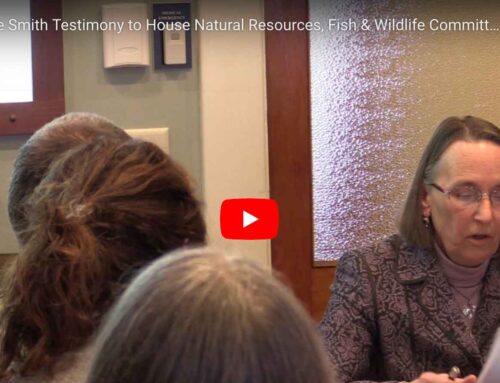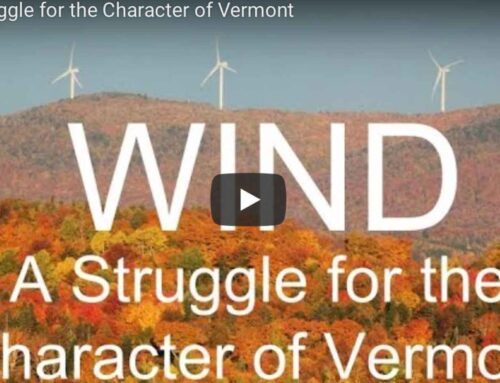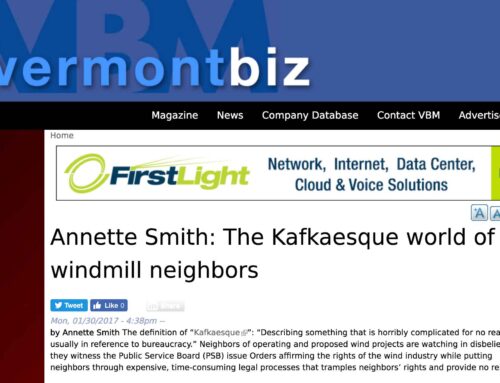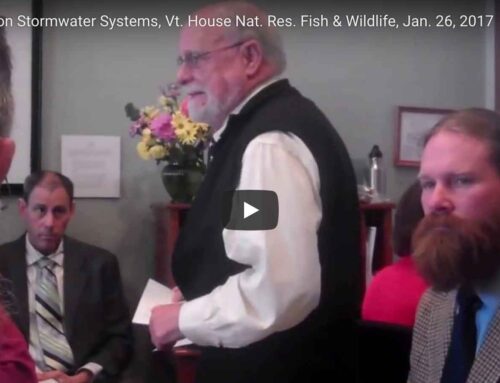OCT. 27, 2016, 7:03 PM
Editor’s note: This commentary is by Annette Smith, the executive director of Vermonters for a Clean Environment Inc. She lives off-grid with solar and serves on Danby’s Planning Commission and the Rutland Regional Planning Commission.
For a period of several years in the early 2000s I compiled news story lists on Vermont environmental issues. I did it for my own purposes and also as a service provided to others. Many people in the environmental community subscribed to my free frequent news story lists, organized by topic such as agriculture, energy, solid waste, groundwater, surface water, etc. Whatever was in the news, the historian in me (B.A. Vassar College in Contemporary European History, 1977) archived it. The public servant in me offered it to people who wanted it. I frequently have needed to refer to these archives in the intervening years.
I do not recall when I stopped compiling the news stories, but I remember why. Energy news. Wind news. So many articles, editorials, commentaries and letters to the editor appeared so frequently that it became nearly impossible to keep up with. All I have to do is type in vce.org/wind and the wind news from Sept. 7 through Dec. 1 appears on one page. In 2002.
At the time, wind energy was raging in Manchester and just surfacing in Londonderry. It is typical of the discussions that have been repeated in too many rural Vermont communities ever since.
Among those articles is a commentary I wrote promoting wind energy. I confess I knew nothing about wind energy at the time. It sounded like a good idea.
On Sept. 27, the Manchester Journal reported “Annette Smith of Danby said that she has become an activist, opposing the gas pipeline proposal as well as the OMYA project. She solidly supports the wind farm. ‘This project is in the right direction,’ she said. ‘If you oppose this renewable energy project, be prepared to support an alternative. Do you want coal, oil, natural gas or nuclear? Where would you locate that kind of plant in your community?’”
Fourteen years ago, the cast of characters was a little different, but not by much. David Blittersdorf, past president of the American Wind Energy Association and founding member and past chair of Renewable Energy Vermont, and Matthew Rubin appear as wind developers. The name Blittersdorf appears 10 times in that batch of news stories. Now-auditor Doug Hoffer did a report for Renewable Energy Vermont. Brian Keefe was chair of the Manchester Planning Commission and is now running for state Legislature. Sabina Haskell was managing editor of the Manchester Journal and is now on the board of the Burlington Electric Commission. Andy Perchlik was the executive director of Renewable Energy Vermont and is now director of the Department of Public Service’s Clean Energy Development Fund. Dave Gram reported on the topic for the AP in 2002, as he does now.
Let’s stop fooling ourselves by continuing conflict and enriching a handful of already wealthy individuals and corporations. Their claims of getting off foreign fossil fuels and creating jobs while saving the planet are not supported by facts. Let’s enable progress by taking big wind off the table.
I spend too much of my time these days digging up files from old computers to answer the questions of people in new communities learning about a new wind project proposed for their area. Heads up, Bolton, you’re next. Seven big wind turbines.
In 2015, I turned on the old computer, this time for the people in Swanton, and found the legislation drafted in 2010 to establish wind turbine noise standards with setbacks and/or decibel levels. In December 2015, I met with House Speaker Shap Smith and put a copy of the 2010 legislation on his desk, along with a copy of Sen. John Rodgers’ just-introduced legislation calling for a ban on big wind turbines in Vermont. I told Speaker Smith that House Natural Resources and Energy Committee Chair Rep. Tony Klein refused to take up the 2010 legislation, arguing that “you people don’t want standards, you just want to ban them, so why don’t you be honest.” So, I said, “Take your pick, we don’t care which, setbacks, noise decibel levels, a ban, can we please have the conversation? How are we going to move forward on renewable energy and siting?” House Speaker Smith said, “We’re not.”
And that is how the conversation about Vermont wind energy has gone for 14 years. The wind industry in Vermont, which presents itself now as Spanish Avangrid/Iberdrola Renewables and Chittenden County’s David Blittersdorf with enabling utilities GMP, VEC, WEC and BED and government agencies ANR, DPS and PSB, has not changed its tune – people don’t like to look at them, there are no other issues. The wind industry consistently ridicules critics while denying problems and dismissing concerns.
Community responses have expanded especially as acoustically complex noise pollution becomes part of the real world experience, along with killing birds and bats, fragmenting forests, hydrological and ecosystem changes, degradation of interior songbird and wildlife habitat, power drawn from the grid, selling the renewable energy attributes so wind is not renewable energy for Vermonters and does not count towards the state’s goals … It’s a long list.
When I am asked to give talks about wind energy, I go back to an old computer and dig out the two-page document I created years ago called “Wind Issues.” It is a menu of the issues surrounding wind energy that Vermonters raise in public meetings as they do their own research and learn about the numerous issues. Solar energy, by comparison, has a short list of issues. Yes, there are issues. But wind energy has a huge number of issues, all magnified when wind turbines are built on Vermont’s ridgelines in our quiet rural communities. The more Vermonters learn, the more opposed they become. [see voter data, below]
How can we move forward on wind energy? We can’t.
Let’s stop fooling ourselves by continuing conflict and enriching a handful of already wealthy individuals and corporations. Their claims of getting off foreign fossil fuels and creating jobs while saving the planet are not supported by facts. Let’s enable progress by taking big wind off the table.
We can move forward with renewable energy for Vermonters and right now our best resource is solar. Vermonters want renewable energy that we can live with, constructed in our communities to serve our homes, businesses and industry. That means building next to load, building projects that serve our communities locally, and retiring the renewable energy credits. And it means that the profiteers must become cooperative collaborators while the politicians must restore and respect our democracy.







